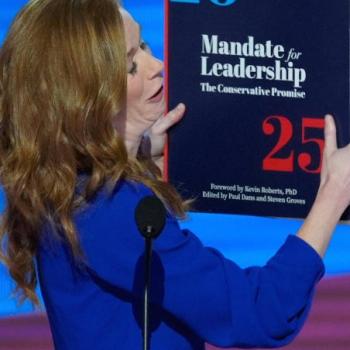Left Behind, pp. 250-251
At the post-U.N.-appearance press conference for Nicolae Carpathia of Romania …
You'll recall that Carpathia's speech consisted of four parts: 1) an alphabetical listing of the member states of the United Nations; 2) a listing of the every secretary-general and their "terms of office, not just by year but also by specific day and date of their installation and conclusion;" 3) a description of "the six principal organs of the U.N.;" and 4) a listing of each of "the 18 U.N. agencies … its current director, and its headquarters city."
LaHaye and Jenkins described this for us over the course of five pages, impressively managing to do so without ever quoting an entire paragraph from Carpathia's remarks. But that was the entire speech — if we can even call it that.
What could reporters possibly ask at the press conference following such a performance? They couldn't ask about Carpathia's agenda, because he never mentioned an agenda. He presented no call to action. (For much of the speech, he didn't even use verbs.) He said nothing about his own country, Romania, or about the challenges he now faced as its newly elected leader in a time of global crisis. He mentioned that crisis itself only briefly, in passing. Most of this "speech," in fact, seemed like the recitation of an encyclopedia entry, so if any reporter did have a follow-up question, they'd be better off going to the reference shelf of the library than to this press conference.
Just try to imagine this press conference:
CARPATHIA: (Speaking first in Mandarin, then Russian, Magyar and finally English) Yes, the gentleman from Time.
KLEIN: Thank you, sir, I was wondering if you could go over the dates for U Thant again …
CARPATHIA: Of course. Pantanaw U Thant was appointed acting secretary-general on November 3, 1961. A Friday. He retired from that office on December 31, 1971, also a Friday. (Repeats this in Arabic and German)
It's hard not to laugh at the thought of such a scene, and this laughter takes us out of the story.
This is dizzyingly strange writing. The Left Behind series is filled with supernatural events, yet none of those miraculous acts of divine or infernal intervention is as jarring as a scene like this. It is here, in the banal and the ordinary, that L&J lose the reader's willingness to suspend disbelief.
The disappearance of two billion people is an astonishing premise, but we're willing to play along. We can accommodate that. Deus ex machina as starting-point? OK, tell us more. But here we have something that ought to seem familiar and completely natural — reporters gather for press conference following politician's speech — and instead it comes across as unimaginably, inhumanly strange. No one talks or acts or thinks in any recognizable way. This we cannot accommodate. We are willing to imagine the unimaginable, the fantastical and outlandish. But get the ordinary this wrong and you lose us.
Fortunately, before we get to the presser itself, there's a bit of commotion surrounding what the authors seem to think of as the second most important news story (the most important being Carpathia's recitation) seven days after the unexplained disappearance of every child on earth. That second most important story is, of course, the reported death of the youngest-ever senior reporter for a national weekly newsmagazine.
At the post-U.N.-appearance press conference for Nicolae Carpathia of Romania, Buck briefly found himself the center of attention. Someone recognized him and expressed surprise and pleasure that he was alive. Buck tried to quiet everyone and tell them that it had all been a misunderstanding, but the furor continued as Chaim Rosenzweig saw him and hurried over, covering Buck's hand with both of his and pumping vigorously.
Rosenzweig doesn't ask what happened. He doesn't ask how Buck survived the car bombing, or if he was its intended target, or why it seems someone is trying to kill him. Instead, he says: "[Carpathia] had so wanted to meet you and had agreed to an exclusive interview."
"Can we still do that?" Buck whispered, to the boos and catcalls of the competition.
"You'll do anything to get a scoop," someone groused. "Even have yourself blown up."
L&J's image of the press corps seems to be based on the City Hall boys from His Girl Friday, which I guess means Buck is Rosalind Russell. Rosenzweig assures him that he can still get his exclusive interview and in doing so demonstrates that neither he nor Buck (nor L&J) knows what "exclusive" means:
"It will probably not be possible until late tonight," Rosenzweig said. His hand swept the room, crowded with TV cameras, lights, microphones and the press. "His schedule is full all day, and he has a photo shoot at People magazine early this evening. Perhaps following that. I'll speak to him."
So, yes, after Carpathia speaks to the entire gathered press corps, and after a jam-packed day of interviews and press events, then Buck can have his "exclusive." This is like those "exclusive" interviews that local reporters claim when they take their last-in-line seat opposite an exhausted and distracted film star at the tail end of a three-day press junket. Even People gets to talk to Carpathia before the GIRAT does (about which more later).
What a "scoop." Not that it matters. As with his supposed cover story on The Event and almost all of the other reporting that Buck Williams does in this book, this interview will never actually be written up or published.
















